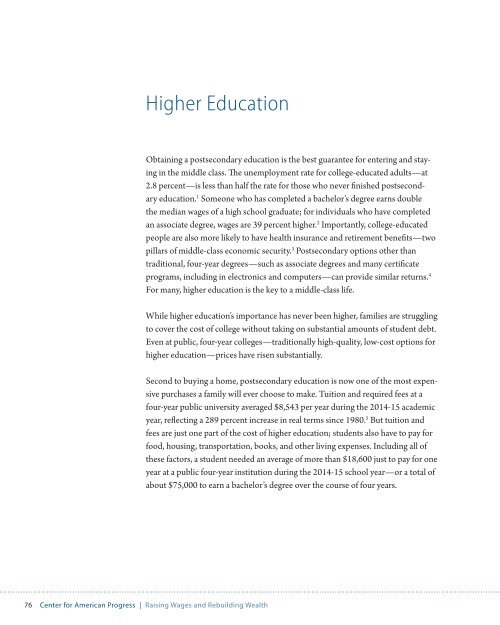AGENCY/PHOTOGRAPHER
RaisingWagesRebuildingWealth
RaisingWagesRebuildingWealth
Create successful ePaper yourself
Turn your PDF publications into a flip-book with our unique Google optimized e-Paper software.
Higher Education<br />
Obtaining a postsecondary education is the best guarantee for entering and staying<br />
in the middle class. The unemployment rate for college-educated adults—at<br />
2.8 percent—is less than half the rate for those who never finished postsecondary<br />
education. 1 Someone who has completed a bachelor’s degree earns double<br />
the median wages of a high school graduate; for individuals who have completed<br />
an associate degree, wages are 39 percent higher. 2 Importantly, college-educated<br />
people are also more likely to have health insurance and retirement benefits—two<br />
pillars of middle-class economic security. 3 Postsecondary options other than<br />
traditional, four-year degrees—such as associate degrees and many certificate<br />
programs, including in electronics and computers—can provide similar returns. 4<br />
For many, higher education is the key to a middle-class life.<br />
While higher education’s importance has never been higher, families are struggling<br />
to cover the cost of college without taking on substantial amounts of student debt.<br />
Even at public, four-year colleges—traditionally high-quality, low-cost options for<br />
higher education—prices have risen substantially.<br />
Second to buying a home, postsecondary education is now one of the most expensive<br />
purchases a family will ever choose to make. Tuition and required fees at a<br />
four-year public university averaged $8,543 per year during the 2014-15 academic<br />
year, reflecting a 289 percent increase in real terms since 1980. 5 But tuition and<br />
fees are just one part of the cost of higher education; students also have to pay for<br />
food, housing, transportation, books, and other living expenses. Including all of<br />
these factors, a student needed an average of more than $18,600 just to pay for one<br />
year at a public four-year institution during the 2014-15 school year—or a total of<br />
about $75,000 to earn a bachelor’s degree over the course of four years.<br />
76 Center for American Progress | Raising Wages and Rebuilding Wealth


